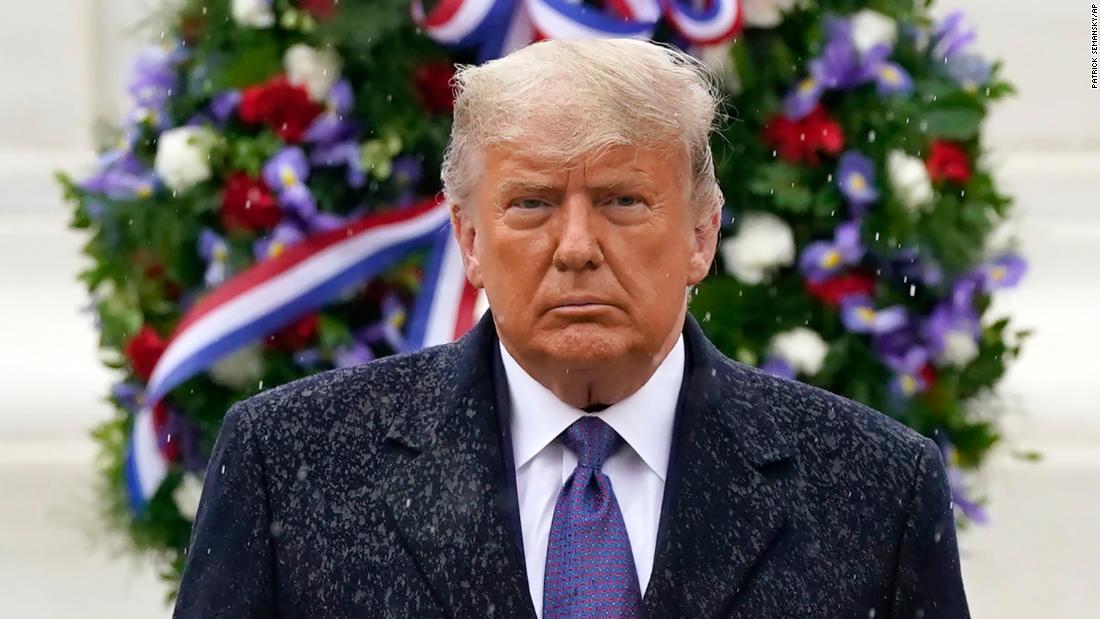He’s playing unsuccessfully at dictator and hammering away at a system of government that is showing itself to be stronger than he is.
Meanwhile, Covid-19 is taking a new root thanks in part to the vacuum in national leadership.
The numbers are staggering, again. In North Dakota, which has no mask mandate,
hospitals are at 100% capacity.
President-elect Joe Biden wants to see masks mandated in all 50 states.
Here are the states that don’t require them in public.
Trump isn’t talking about Covid at all. Rather than work with his successor and mobilize the government he leads to save American lives, Trump has retreated into a post-election bunker mentality that exposes just how distracted he has been from the singular issue of his presidency.
If Trump wants an example of what he should be doing instead, he could look at the way President George W. Bush created plans to guide his successor, Barack Obama, during the financial crisis, including
bringing in Obama’s transition team for briefings after the 2008 election. (I’d put the Covid crisis up against the financial crisis any day.)
Everyone else is talking about Covid, proving Trump wrong. The President swore coverage of Covid would disappear after the election, but his promise was based on the fake projection that the disease was overblown.
And Trump’s unyielding refusal to embrace an active strategy about Covid will ultimately prove to be the downfall of his presidency and a mark on his legacy.
Instead, Trump’s focused only on rejecting his defeat in the courts and pushing loyalty tests in his Cabinet. His effort to consolidate his power at the Pentagon makes you wonder if he’s putting the pieces together for a sort of coup d’état.
Weak sauce. Legal experts do not seem particularly worried that Trump has ousted Senate-approved officials and put in temporary loyalists for his last two months in office.
Read this
Washington Post op-ed from Erica de Bruin, a Hamilton College professor who’s the author of “How to Prevent Coups d’État.” She argues that if Trump overstayed his welcome, it would be more self-coup than coup, a distinction she describes and is actually important.
When should you worry? Start to worry when there is evidence Trump has the military behind him. There is none.
As with so much in Trump’s administration, what seems like it could be part of a diabolical strategy could actually be nothing more than a pathetic lack of any strategy whatsoever.
You must, however, assume there is some strategy in a coordinated house-cleaning of civilian leaders at the Pentagon because that’s the kind of thing dictators and despots do.
But the evidence is also finally proving this system is stronger than the man as his legal challenges to the election founder and, bit by bit, Republicans move on.
Politico wrote about a news conference attended by state GOP lawmakers to question the vote in Pennsylvania. Only a fraction of them showed up.
The long-run issue. Senators like Lindsey Graham of South Carolina and even Senate Majority Leader Mitch McConnell of Kentucky are contributing to the problem, encouraging the collective frothing at the mouth among Republicans who refuse to believe Trump lost.
This will be a more lasting problem if Republican voters follow him and lose faith in the system rather than accept a result they don’t like.
How many will die before January 20?
According to the
IHME model, there will be somewhere between just shy of 300,000 total US deaths and more than half a million, depending on whether masks
are used or mandates are eased.
Regardless, with the US now again losing more than 1,000 lives to Covid each day, there will be at least tens of thousands of people who die during the presidential transition.
New mask guidance
The CDC has updated its guidance on masks and now says wearing face coverings is effective in protecting the wearer as well as people around them. Previous guidance had stressed masks to help protect others.
From
CNN’s report:
The new guidance cites a number of studies showing that masks reduce the risk of transmitting or catching the virus by more than 70% in various instances. One study revealed mutual mask-use helped prevent two infected hair stylists from transmitting the virus to 67 clients who were later interviewed. Another followed infected people who spent more than 10 hours on flights without infecting other passengers when masks were used.Some cloth masks are nearly as good as surgical masks at blocking droplets, the CDC said. Polypropylene may generate a static charge that captures particles, the CDC said, while silk might repel moist droplets and be more comfortable.
